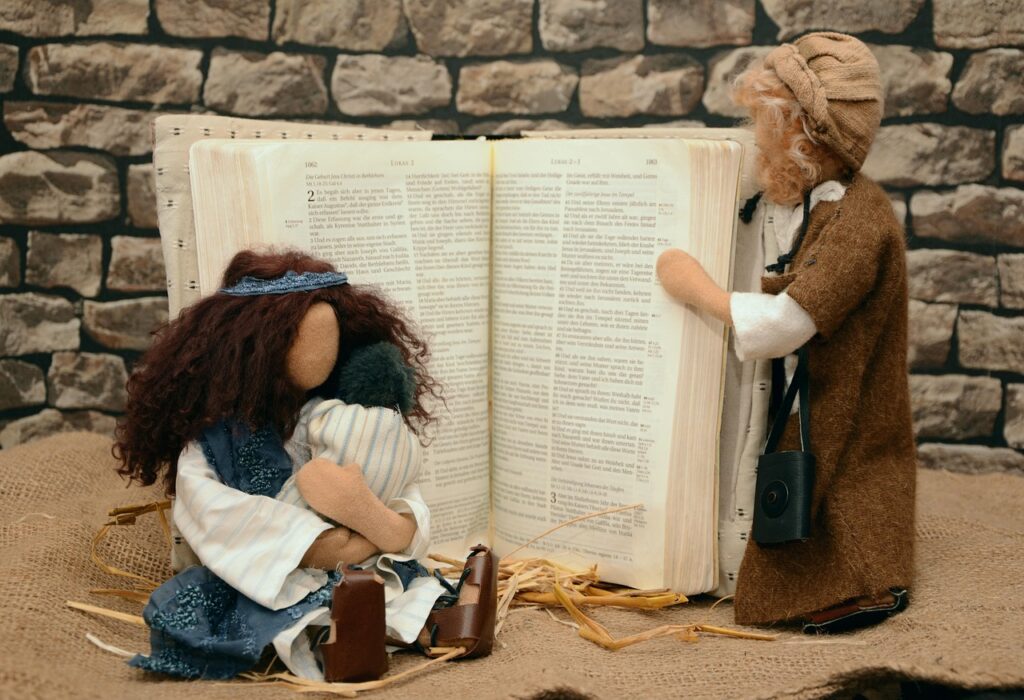One would think that if you were purchasing something advertised as a Bible curriculum, it would be…..well, biblical. Unfortunately, read reviews of some of the most popular Bible class curricula for children and teens and you may find the word secular mentioned or alluded to on a regular basis. So what do reviewers mean by their critiques and how can you find out if the curriculum you are using is biblical or secular with a biblical “varnish” on it?

It is important to first consider the goals of Bible classes for children and teens. They have changed since the inception of “Sunday school” and other Bible classes in the 1800’s. Originally meant to expose children in non-Christian, primarily poor families to biblical teachings, by the mid 1900’s Bible classes for children and teens were seen as helpful supplements to the biblical teaching young people were receiving at home. Ask most people responsible for purchasing the curricula now and they will probably admit their classes are expected to do the job of basic biblical teaching that should be happening in the home. While that is a loaded statement, the impact of that belief is that we should be using curriculum that has a strong biblical basis and insures young people are taught the basics of the Christian faith in meaningful ways.
Here are some questions to ask as you think about your current curriculum.
- Does the curriculum focus on morals as its core purpose? Morals aren’t a bad thing, but they also are only a part of being a Christian. If morals are taught without being tied to the concepts of obedience and sin, it is even more likely your curriculum is basically secular.
- Is there anything taught that could be considered theology and does it align with scripture? Books could be written about this, but for our purposes write down some of the messages in several lessons at each age level. Are those messages teaching a biblical or a secular theology?
- Who is God and how is He described? Does God seem secondary or almost totally omitted or replaced with Jesus? Is God portrayed accurately with all of His character traits or as a shallow or unengaged version of who He actually is? Does God ever get angry or hand out consequences to anyone? A biblical curriculum is going to paint a full picture of who God is and not omit teaching about aspects of God that are perhaps more difficult to explain or understand.
- Does the curriculum use the words sin and Satan? Sadly, there is a growing group of people calling themselves Christian who don’t believe in sin or Satan (or Hell for that matter). It starts by omitting the concepts of sin, Satan and Hell from curricula for children and teens, because they are unpleasant topics. Spiritual development begins with a fear of the Lord and this directly connects to Satan, sin and Hell. If your curriculum omits or minimizes them, it is secular at its core.
- Does it teach personal responsibility and that Jesus died for our sins? Focusing on being a “good person” without teaching about personal sinful choices and the need to accept responsibility for them is dangerous. Older kids and teens especially need to understand personal accountability and the consequences for disobeying God.
- Does it emphasize obeying God – regardless – or is there an implied or stated situational morality? If your curriculum doesn’t teach God’s commands as commands and the importance of obedience, there is a serious problem. This is made even worse if the students are given scenarios and told their ultimate choice can be right regardless – it’s their choice. Any hint that morality is subjective is secular.
- Does it minimize or try to explain miracles as a scientific rarities that do occasionally happen? Thomas Jefferson famously fell into this trap. Everything must be explained or it couldn’t have happened. Removing miracles from stories, failing to call them miracles or trying to explain them as something that happens occasionally undermines God in so many ways.
- Does the curriculum address sin, consequences, repentance, forgiveness and redemption regularly and in detail? At its core, Christianity is built on the arc of the Fall in the Garden of Eden as a result of sin and its leading to Jesus coming to Earth and dying for our sins. The Great Commission is based on teaching everyone this and encouraging them to repent and be baptized for the forgiveness of their sins and to receive the Holy Spirit. Any curriculum that eliminates or minimizes these core principles is secular. Preferably these ideas should be repeated so often that young people can join in and share this basic Gospel message with no prompting.
- Are the activities fun with little if any meaningful ties to the Bible story or concept? I was handed a Bible lesson from a popular curriculum recently that featured two activities. One involved running around the room looking for clues for random objects, like a carrot, that had nothing to do with the story. The second involved setting up an obstacle course that included jumping over a stack of Bibles. Such a waste of precious spiritual educational time. Activities can be fun, but they should expand the students’ knowledge, understanding or application of the biblical commands or principles in the lesson. Not just random silliness with a questionable statement at the end that is supposed to give it meaning.
Choosing curriculum is never easy. There is no perfect curriculum, because at the end of the day profits are what matter to publishers. Don’t let a slick sales pitch, however, convince you to purchase a curriculum that is secular at its core.




